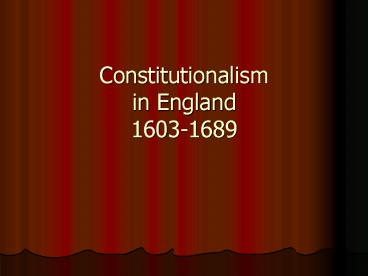Constitutionalism in England 1603-1689 - PowerPoint PPT Presentation
1 / 13
Title:
Constitutionalism in England 1603-1689
Description:
Constitutionalism in England 1603-1689 English Leaders 1603-1689 James VI of Scotland becomes James I of England 1603-1625 3. Oliver Cromwell Lord Protector 1649-1660 ... – PowerPoint PPT presentation
Number of Views:93
Avg rating:3.0/5.0
Title: Constitutionalism in England 1603-1689
1
Constitutionalismin England1603-1689
2
(No Transcript)
3
Tudors
- War of Rosesaristocracy fought over who would
control the monarchy - Henry VIII r.1509-1558strengthened power of
monarchy, lots of wives, created Anglican Church - Queen Elizabeth r. 1558-1603 (daughter of king
and Anne Boleyn and nicknamed the Virgin Queen)
very able and practical ruler, used the prospect
of marriage to create political alliances. Kept
Mary (her half sister) Queen of Scots locked up
because she thought Mary was plotting against
her. Mary was the rightful heir to the throne
after Elizabeth.
4
- Act of Supremacy 1559 repealed all
anti-Protestant legislation of Mary and gave
Elizabeth supreme rights over spiritual affars - Puritans gave her trouble, wanted to reform the
church but Elizabeth wouldnt have it
5
- Treaty of Berwick 1586 Elizabeth entered a
defensive alliance w/Scotland and recognized
James, Marys son (protestant) as the rightful
heir to the throne - 1588Philip IIs Spanish Armada was defeated-this
was the greatest achievement of her reign - English Renaissance happened during her reigion
(Shakespeare) - 1587, Elizabeth ordered the execution of Mary,
Queen of Scots
6
James I of England1603-1625 (aka James VI of
Scotland)
- 1st thing he told ParliamentDo not try to
challenge me - King has the power to dismiss Parliament but
Parliament has control of revenuesthis will be a
constant battle in the coming years - Puritans were more demanding of reforms, many
left to found a colony in MA
7
Charles I
- Politically inept
- Parliament would only grant him customs duties
for one year instead of the life of the monarch
which was tradition - Due to military failures, he asked Parliament for
more --they didnt give it to him - Parliament forced him to sign Petition of
Rightsno w/out consent of Parliament, no
imprisonment w/out just cause, no martial law
against citizens
8
- Charles dissolves Parliament and rules 11 years
w/out them, collecting ship money - When he tried to impose religious changes on the
Scots, they rebelled. Charles called back
Parliament to ask for (Short Parliament)they
said no - He called them again (Long Parliament), they gave
him a list of grievances called Grand
Remonstrance Charles fled
9
English Civil War
- Roundheads vs. Cavaliers
- Oliver Cromwell supported Parliament, and with
his New Model Army, captures Charles I - Rump Parliament (all Presbyterians removed)
condemned Charles and he was executed
10
Oliver Cromwell1649-1660
- Known as The Commonwealth
- Military dictatorship, he was Lord Protector
- Had religious troubles to deal with
- Parliament was difficult to control
11
Charles II
- Church of England restored as official church but
signed a secret treaty w/France in which he
agreed to make England Catholic - Parliament grew suspicious of Charles and passed
the Test Act of 1673only Anglicans could hold
public office
12
James II1685-1688
- Catholic
- Repealed the Test Act
- He appeared to champion religious toleration but
this was deceptivehe really wanted to bring back
royal absolutism - He fathered a child which made Parliament
nervousthey didnt want to continue w/Catholic
kings
13
Glorious Revolution
- Political elite invited William of Orange and
Mary to take over the throne. They had to sign
the Bill of Rights, recognizing the supremacy of
Parliament and agree to other acts (Act of
Toleration, Mutiny Act, Act of Settlement, Act of
Union)

